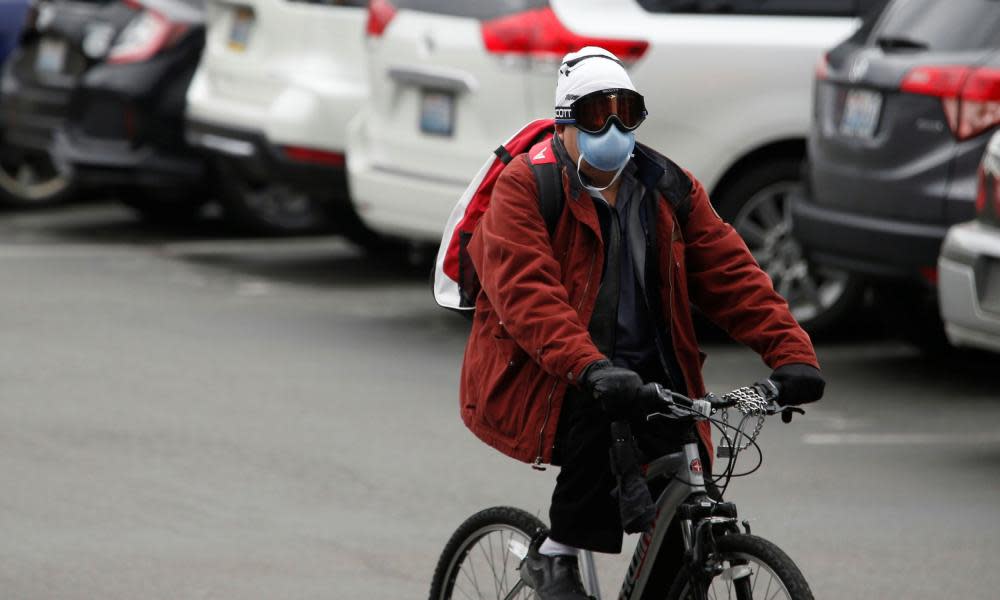Washington state residents frustrated over obstacles to get coronavirus tests

As Washington state faces a rapidly evolving coronavirus outbreak, which has already claimed nine lives there, residents on Tuesday reported a frustrating array of misinformation and obstacles as they were seeking to get tested.
One potential sufferer in the state, Jeannette Jameson, 61, a criminal defense lawyer, told the Guardian that she had been sick for about a month when her doctor suggested she go to an emergency room to be tested for the virus.
Related: Coronavirus: health experts concerned US hospitals are not prepared
On Monday, Jameson went to Providence hospital in Everett, Washington, and after waiting for over two hours near dozens of other sick people, she was escorted to a chair in the hallway, separated from other patients with respiratory symptoms by carpeted wall partitions.
Jameson said she never saw a doctor, and after testing negative for flu and being given a chest X-ray, she was discharged with papers that said she had “some non-specific respiratory virus”, along with prescriptions for ibuprofen and acetaminophen.
When she asked why she wasn’t given a test for coronavirus, she said that a nurse practitioner told her she could only get tested if she was admitted to the hospital with severe symptoms.
“The words that they were using were so misleading, basically, as though: ‘Don’t worry, you don’t have it, you know, you’re fine,’ and saying even if you had it it’s mild for most people,” said Jameson, who lives in Bothell, Washington. She added: “But not caring that I might go and infect someone who then it wouldn’t be mild for.”
After the flu test results came back and Jameson asked about the coronavirus test, she said the registered nurse practitioner told her: “You should be glad you don’t have influenza because that’s worse than coronavirus.”
The death rate for coronavirus is much higher than for the flu.
A frustrated Jameson later said she told the nurse: “This is like a third-world country.” The nurse responded: “Now you’re just being dramatic.”
So Jameson still does not know if she has coronavirus.
In a statement to the Guardian, Providence hospital said: “In Snohomish county, with the limited availability of test kits at this time, one of the criteria for testing has been that the patient is ill enough to warrant hospital inpatient care. Due to an influx of patients in the emergency department, wait times are longer than normal for people who do not have severe symptoms.”
Washington state, in the Pacific north-west, had 27 confirmed cases of coronavirus by Tuesday afternoon. Confirmed cases across the US have exceeded 117.
Most coronavirus infections cause mild symptoms, but for some at a higher risk, including older people and those with chronic illness, it can cause more severe symptoms. Officials think the virus spreads mainly through coughs or sneezes.
The confusion associated with the testing is probably because tests have expanded recently, explained Janet Baseman, the associate dean for the University of Washington’s School of Public Health.
Initially, testing was limited to the federal Centers for Disease Control and Prevention (CDC) lab and reserved for those who had symptoms and had a travel history to China or contact with a known case, she explained.
In the last several days, however, Washington state has been able to test patients using a local laboratory, while local healthcare providers have been given more say over who should get tested.
“It’s a hard time and a frustrating time for people or providers who want to have their patients tested,” said Baseman. “I believe it’s going to get a lot easier.”
The state’s public health laboratory can now test approximately 200 specimens a day and is able to keep up with all requests, Dr Kathy Lofy, the state health officer at the Washington state department of health, said during a press conference Monday.
There will also be additional testing completed at a lab at the University of Washington in Seattle. It was not immediately clear when testing would start.
Meanwhile Diane Smith said her 10-year-old grandson had come home from visiting his mom on Sunday with a bad cough and a stuffy nose.
Smith has chronic obstructive pulmonary disease, which she said puts her at a high risk for coronavirus, so she wanted to get him tested. Smith, 66, who lives in Yelm, Washington, said she called urgent care on Monday and Tuesday, but they repeatedly told her that it was probably just the cold or flu and not to get tested.
“They definitely need to ramp up the testing and figure out how to get people tested and give us information on where we can get tested … so those of us who are high risk and have a sick person in our house, we will know if he’s got it or not,” she said.

